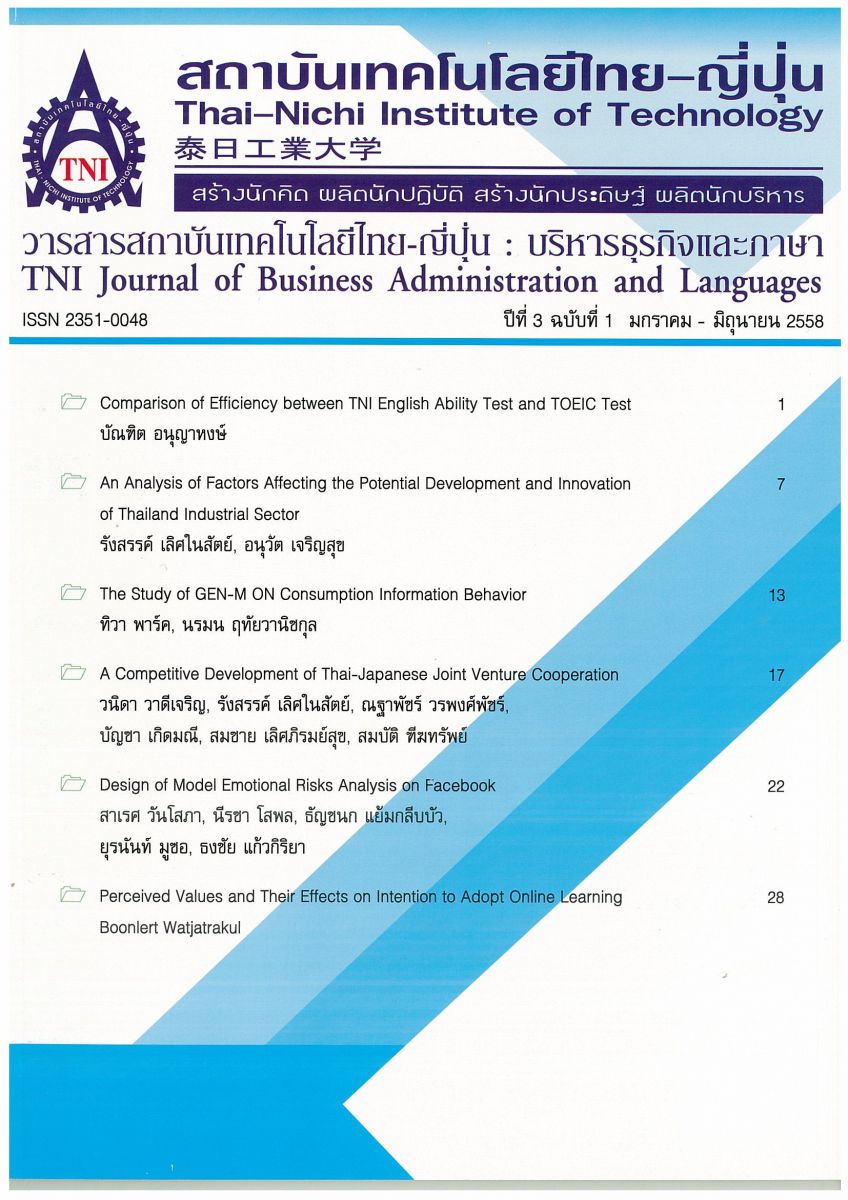The Relationships between Academic Self-efficacy and Academic Achievement for Business Finance Course
Main Article Content
Abstract
This study is to ascertain the relationships between an academic self-efficacy and academic achievement among the undergraduate students who are enrolled in this Business Finance course. Besides, an academic self-efficacy is divided into three dimensions as persistence, self-determination and self-reliance which could affect either an academic success or failure of the students. In additional, the past record has shown that the students who have no confidence in their academic capabilities, they tend to withdraw from this course before ending the semester. Therefore, there are two research objectives. First, it is to explore the relationships of each dimension of self-efficacy towards the academic achievement. Second, it is to find solution for increasing their academic self-efficacies. Consequently, the student would more persist in studying until end of semester and withdrawer rate will be decreased. The data were in-class collection of 94 students and they were then analysed by using Multiple Regression analysis with moderating effect of academic background of Art and Science major. The research findings are persistence and self-reliance have positive and significant effect toward academic achievement, and an interaction effect is significant then moderation is present.
Article Details
Article Accepting Policy
The editorial board of Thai-Nichi Institute of Technology is pleased to receive articles from lecturers and experts in the fields of business administration, languages, engineering and technology written in Thai or English. The academic work submitted for publication must not be published in any other publication before and must not be under consideration of other journal submissions. Therefore, those interested in participating in the dissemination of work and knowledge can submit their article to the editorial board for further submission to the screening committee to consider publishing in the journal. The articles that can be published include solely research articles. Interested persons can prepare their articles by reviewing recommendations for article authors.
Copyright infringement is solely the responsibility of the author(s) of the article. Articles that have been published must be screened and reviewed for quality from qualified experts approved by the editorial board.
The text that appears within each article published in this research journal is a personal opinion of each author, nothing related to Thai-Nichi Institute of Technology, and other faculty members in the institution in any way. Responsibilities and accuracy for the content of each article are owned by each author. If there is any mistake, each author will be responsible for his/her own article(s).
The editorial board reserves the right not to bring any content, views or comments of articles in the Journal of Thai-Nichi Institute of Technology to publish before receiving permission from the authorized author(s) in writing. The published work is the copyright of the Journal of Thai-Nichi Institute of Technology.
References
Brakke, D. F., & Halpern, L. D. (2014). Improving Success of Students in Introductory Mathematics and Statistics Courses. AAC&U, Peer Review, Summer 2014.
Najafabadi, A. T. P., Najafabadi, M. O., & Farid-Rohani, M. R. (2013). Factors contributing to academic achievement: a Bayesian structure equation modeling study. International Journal of Mathematical Education in Science and Technology, 44(4), 490-500.
Verma, A., & Sharma, B.(2013). Construct Validation of Self-Efficacy Scale. The IUP Journal of Soft Skills, 7(4), 15-26.
Schwarzer, R., & Jerusalem, M.(1995). Generalized Self-Efficacy Scale, in J Weinman, S Wright and M Johnston (Eds.), Measures in Health Psychology: A User’sPortfolio, Causal and Control Beliefs, 35-37, NFER-NELSON, Windsor, UK.
Tipton, R. M., & Worthington, E. L. (Jr.) (1984). The Measurement of Generalized Self-Efficacy: A Study of Construct Validity. Journal of Personality Assessment, 48(5), 545-548.
Leal, E. A., Miranda, G. J. & Carmo, C. R. (2013). Self-Determination Theory: An Analysis of Student Motivation in an Accounting Degree Program. Revista Contabilidade & Financas- USP, Sao Paulo, 24(62), 162-173.
Fornell, C., & Larcker, D. (1981). Evaluating structural equation models with unobservable variables and measurement error. Journal of Marketing Research. 18(1), 39-50.
Hari, J. F., Black, W. C., Babin, B. J., & Anderson, R. E. (2009). Multivariate data analysis (7th ed.). Upper Saddle River, NJ:Prentice Hall.
DemirciGuler, M. P. (2013). Success and failure in science education: A focus group study on Turkisk students. Journal of Baltic Science Education, 12(6), 716-729.
Tinto, V. (1993). Leaving College: Rethinking the Causes and Cures of Student Attrition, 2nd ed. Chicago: University of Chicago Press.
Napoli, A. R. & Wortman, P. M. (1998). Psychosocial factors related to retention and early departure of two-year community college students. Research in Higher Education, 39(4), 419-455.
Stuber, J. M. (2011). Integrated, marginal, and resilient: Race, Class, and the diverse experiences of white first-generation college students. International Journal of Qualitative Studies in Education, 24(1), 117-136, doi: 10/1080/09518391003641916.
Crisp, G., & Cruz, I. (2009). Mentoring college students: A critical review of the literature between 1990 and 2007. Research in Higher Education, 50, 525-545.doi: 10.1007/s11162-009-9130-2.
Byerly, T. R. (2013). The Special Value of Epistemic Self-Reliance. 2013 John Wiley & Sons Ltd.
Zagzebski, L. (2007). ‘Ethical and Epistemic Egoism and the Ideal of Autonomy’. Episteme, 4(3).
Zagzebski, L. (2012). Epistemic Authority: A Theory of Trust, Authority, and Autonomy in Belief. Oxford: Oxford University Press.


